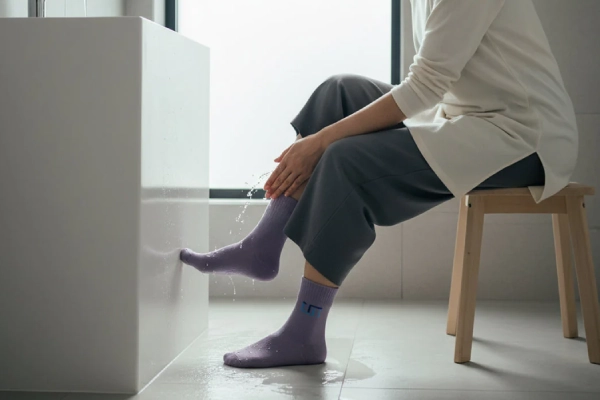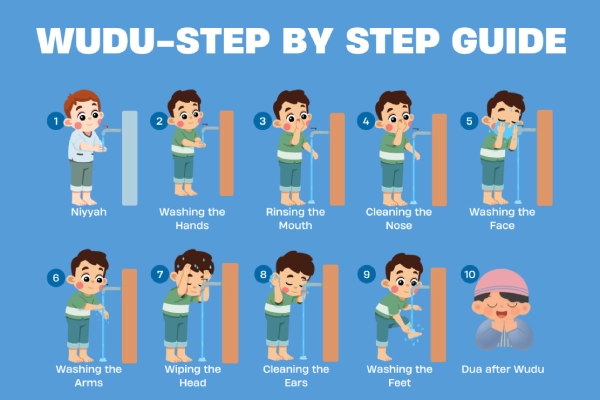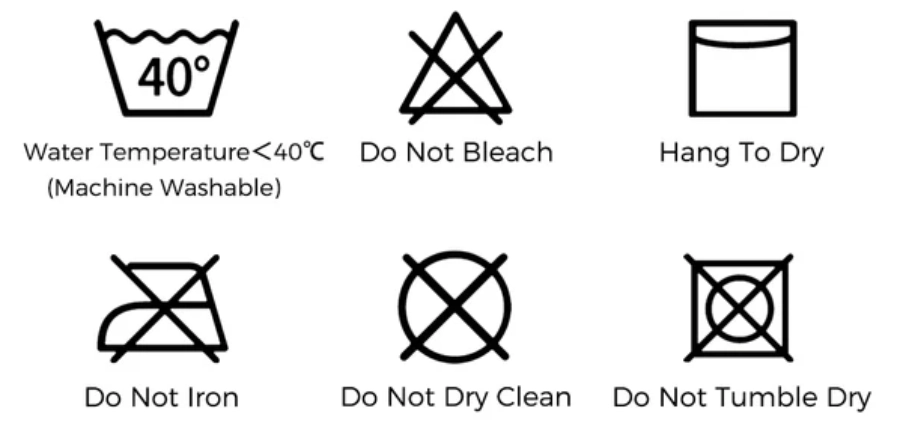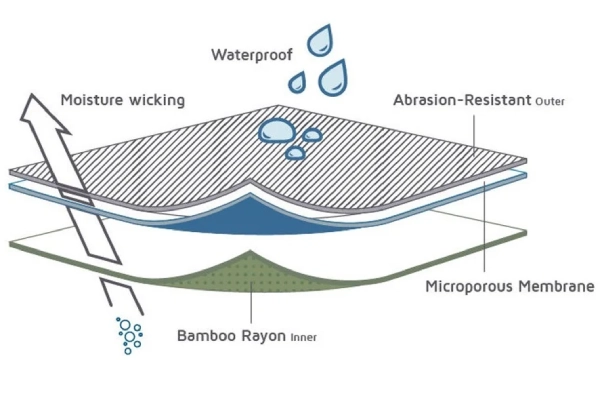What Are Wudu Socks?

Wudu socks are purpose-built socks that let a Muslim perform masah—wiping over the socks—in place of washing the feet during minor ablution, provided the socks remain intact and cover the ankles. If you need detailed rulings and conditions by school, see our concise overview of the halal conditions for wudu socks.
Halal Use & Conditions

Most readers only need the essentials:
- Socks should be put on after a complete ablution and must cover the ankles.
- They should be intact (no tears that expose skin where wiping is required).
- Wiping normally covers the upper foot area; duration allowances vary by school and travel status.
If you want the point-by-point version (duration, when to renew, travel exemptions), we summarize each madhhab in plain language here: Wudu socks halal & fatwa notes.
Wudu Socks vs. Khuff vs. Regular Waterproof Socks
Many shoppers ask whether a modern knit wudu sock replaces traditional leather khuff, or if any waterproof sock will do. Start with this quick comparison:
| Dimension | Modern Wudu Socks Designed for Masah | Traditional Khuff (Leather) Classic | Regular Waterproof Socks Outdoor |
|---|---|---|---|
| Halal suitability | Designed for masah (check conditions) | Historically established | Often not designed for masah |
| Breathability & comfort | High (membrane + lining) | Medium (warmer, heavier) | Medium to high |
| Typical use | Office, campus, travel | Winter, classic use | Hiking, cycling |
| Retail price | $25–35 | $20–35 | $25–40 |
A fuller point-by-point comparison is here: wudu socks vs. khuff, and a clarification on wudu socks vs. ordinary waterproof socks.
Materials & Build (3-Layer That Actually Breathes)
The best-selling builds use a 3-layer sandwich: an abrasion-resistant outer knit (nylon or polyester), a waterproof/breathable membrane (PU or ePTFE), and a comfort lining (bamboo viscose or merino).
- Outer knit: durability, snag resistance, colorfastness.
- Membrane: waterproof rating and breathability balance.
- Inner lining: moisture management, odor control, seasonal comfort.
If you’re comparing membrane types, stitch density, taping, and lining choices, bookmark this deep dive: materials & waterproof ratings for wudu socks.
Pros/cons at a glance
| Choice | Pros | Trade-offs |
|---|---|---|
| PU membrane + bamboo lining | Soft feel, budget-friendly | Slightly less breathable |
| ePTFE membrane + merino lining | Top breathability, winter warmth | Higher cost |
| Thin summer knit | Cooler, faster dry | Lower warmth/loft |
| Thick winter knit | Warmer, plush | Slower dry time |
Sizing & Fit
Coverage matters for masah, but comfort matters for all-day wear. Focus on foot length to size, then check stretch recovery and ankle coverage. If your foot is between sizes or you prefer thicker socks underneath, size up.
A printable chart and tips for women’s and small sizes are here: wudu socks size guide.
How to Use Wudu Socks (Office/Travel)

Most users follow three simple steps:
- Complete ablution for hands, face, etc., keeping socks on.
- Wipe the upper foot area up to the ankles (per your school’s method).
- Dry any drips, then continue your day.
For photos, common pitfalls, and acceptance checks, see: how to use wudu socks in 3 steps.
Care & Odor Control

Machine-wash cold in a laundry bag, low-heat dry or air-dry, avoid fabric softeners (they can affect membranes). Replace socks that have visible damage or persistent seepage.
Detailed care and deodorizing guidance lives here: how to wash wudu socks.
Regional Pricing Snapshot (US/UK/UAE/MY)
Use these market-typical bands as orientation; promotions around Ramadan and Hajj/Umrah can shift prices.
- US: $25–35 retail; UPS/USPS 3–5 business days.
- UK: £20–30 retail; Royal Mail 2–4 business days.
- UAE: AED 85–130 retail; local couriers 2–5 business days.
- MY: RM 70–120 retail; J&T and peers 2–5 business days.
If you’re planning a purchase or quotation, we maintain current examples and a simple landed-cost worksheet here: wudu socks pricing.
Pricing & Procurement (Retail, Wholesale & OEM)

Retail tiers
- Entry: $19–24 (basic water resistance, check masah suitability).
- Mainstream: $25–35 (3-layer with bamboo lining).
- Premium: $36–49 (merino lining, thicker builds, or heated options).
OEM cost drivers you’ll actually feel in the unit price: membrane brand/weight, lining type, stitch density, seam sealing, number of sizes, packaging, and QA standards.
If you’re sourcing, start with our plain-English checklist and supplier email template: wudu socks wholesale & OEM guide.
Seasonal Picks
- Winter: thicker knits, merino linings, taller cuffs.
- Summer: thin knits, quick dry, lighter cuffs.
If you’re deciding between two builds for mixed climates, check the materials & waterproof ratings overview and the size guide links above to keep comfort and coverage in balance.
FAQs
Are wudu socks halal?
Yes—if the socks are intact, cover the ankles, and you put them on after a full ablution, wiping (masah) is generally permitted. Specific conditions vary by school and travel status. See our plain-English summary of wudu socks halal conditions before you buy or use them.
How long can you wear wudu socks for wiping?
Common practice allows wiping for 24 hours for residents and up to 72 hours for travelers, counted from the first wipe. Some schools differ on edge cases (sleep, removal, renewal). When in doubt, follow your local opinion explained in our halal conditions & notes.
Do wudu socks need a 3-layer build?
Not strictly, but most modern pairs use a knit outer, waterproof/breathable membrane, and a comfort lining to keep feet dry and comfortable. The membrane type and stitch density affect heat and durability—compare options in our materials & waterproof ratings guide.
What size should I buy (men/women)?
Measure foot length, then match the chart; ensure ankle coverage without excessive tightness. Women and smaller feet often prefer softer cuffs and more granular sizes to prevent slippage. Fit tips, conversions, and warm-weather notes are in the wudu socks size guide.
Do women need different wudu socks?
Many do better with softer cuffs, slimmer lasts, and smaller sizes to prevent slippage while maintaining ankle coverage. Look for women-specific ranges and follow the chart. Our picks and fit notes are in women’s wudu socks.

For organizations (mosques, schools, resellers): tell us sizes and use cases, and we’ll ship a 3-pair kit. Typical lead time: 20–30 days for production after approval. Get a quote from Max Hosiery.
